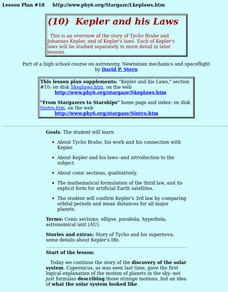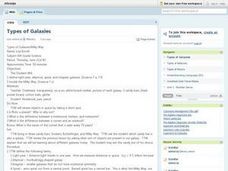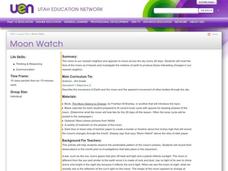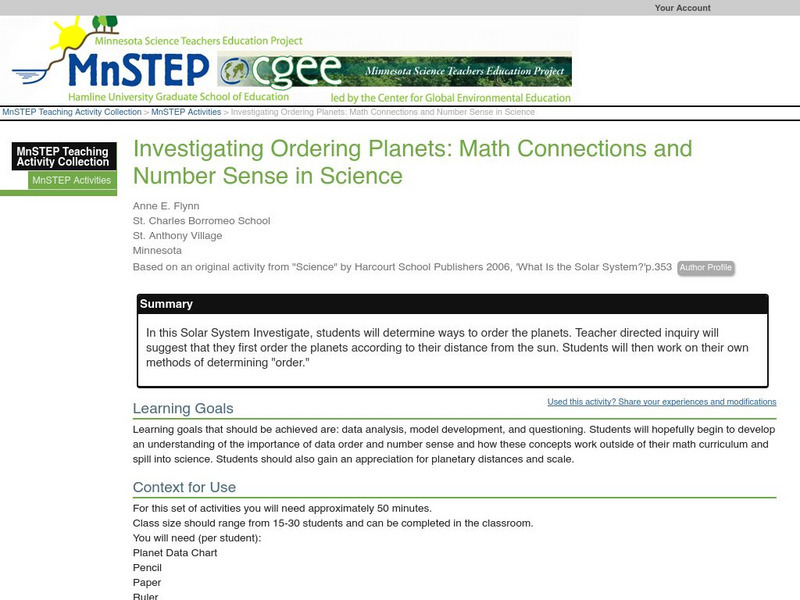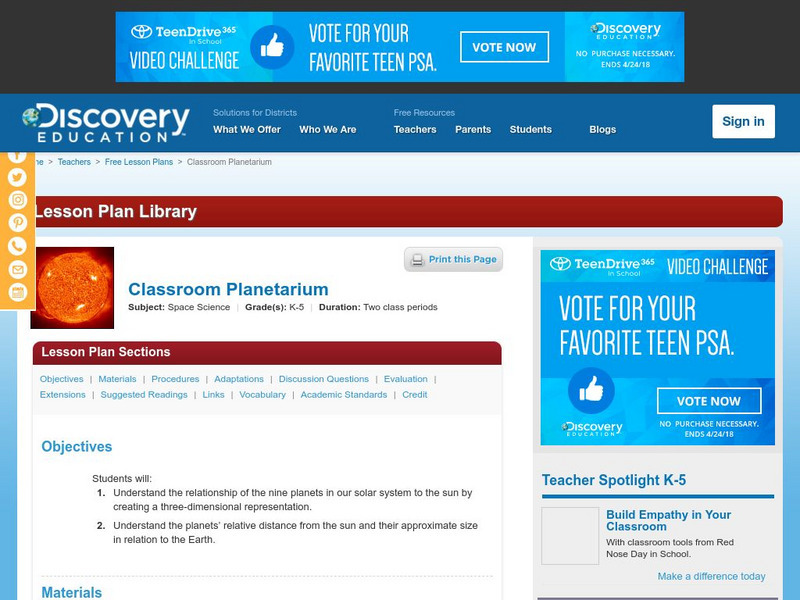Curated OER
Wax On, Wane Off
Young scholars explore the Earth's only natural sattelite, the moon. They view a demonstration using tennis balls of the waxing crescent moon, waxing gibbous moon and a lunar eclipse.
Curated OER
"Space" Investigations
Sixth graders understand the patterns of change observable on Earth as a result of the movement of the different bodies in the solar system. They identify the physical characteristics of the different components of the solar system.
Curated OER
Measuring Elevation
Students practice measuring elevation, one of the key coordinates used by astronomers. They describe how the elevation of an object is measured.
and combine compass directions and elevation to find celestial objects.
Curated OER
The Mathematical Fingerprint of Our Solar System
Students study the beautiful mathematical model unique to our solar system.
Curated OER
A Relatively Far Out Idea: Estimating
Students investigate methods of estimating through cooperative group activities, hands-on activities, the use of tables and graphs and an interactive video.
Curated OER
Star Wars Activity
Students investigate radiant energy by completing discrepant events and identify various temperature changes through absorption and how radiant energy can be used for solar panels. They experiment with different color fabrics in order...
Curated OER
Kepler And His Laws
Students engage in an overview of the story of Tycho Brahe and Johannes Kepler, and of Kepler's laws. Each of Kepler's laws be studied separately in more detail in later lessons. They examine Kepler's 3rd law.
Curated OER
Scientific Notation
Sixth graders work with the concept of scientific notation. They work as a class to begin a worksheet on how to change large numbers into scientific notation. They complete the worksheet either individually or in groups.
Curated OER
Types of Galaxies
Eighth graders take a quiz to review the different objects in space. As a class, they define terms related to galaxies. In groups, they make a model of the Milky Way galaxy using materials provided to them by their teacher. To end the...
Curated OER
Star Frames
Fourth graders study constellations. For this space science lesson, 4th graders discover what makes stars, how bright stars are, and why constellations were created. Students make their own constellation using Saran Wrap and a frame.
Curated OER
Moon Watch
Third graders read books about the moon and discuss its perceived changes as it moves across the sky. They observe the moon over the course of a month and chart their observations. They discuss their observations and conduct further...
Curated OER
Water World Story
Fourth graders write a story about how a drop of water may have traveled to school. They design a presentation on the water cycle.
Science Education Resource Center at Carleton College
Serc: Investigating Ordering Planets: Math Connections & Number Sense in Science
In this Solar System Investigate, students will determine ways to order the planets. Teacher directed inquiry will suggest that they first order the planets according to their distance from the sun. Students will then work on their own...
Discovery Education
Discovery Education: Classroom Planetarium
Create a classroom model of the solar system while teaching about relative size of all the planets, and each planet's distance from the sun.
PBS
Pbs Learning Media: Solar System Scale Model
Teach the concept of scale models and the size of the solar system through this extensive lesson plan. Students will learn about scale models, estimate which objects to use to create a scale model of Earth and Sun, and figure out how far...
Other
Making a Scale Model of the Solar System
In this lesson plan site, students are asked to construct a scale model of the planets to help visualize the relative size of planets and their relative distance from the Sun. Links are provided to the Sun and the planets which contain...








